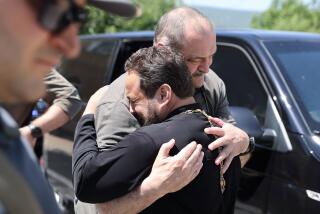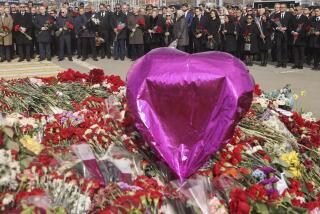Russia’s hot spot
The suicide bombings of two Moscow subway stations that killed 39 people Monday appear to have emanated from a place that few people could find on a map: Russia’s North Caucasus region, a sliver of land wedged between the Black and Caspian seas that is home to 7 million people.
Russian czars annexed the North Caucasus in the latter part of the 19th century after wars that lasted several decades, but the people in the region were reluctant Russians. No sooner did the Soviet colossus start wobbling than the region, particularly the breakaway republic of Chechnya, descended into chaos.
The results have been gruesome. Russia has fought two full-scale wars to retain control of Chechnya (from 1994 to 1996 and from 2000 to 2009), though Moscow has tried to cast its role as fighting terrorism. In 2009, Russia proclaimed victory by declaring an end to its “counter-terrorism operations” in Chechnya and turned over full control to the republic’s president since 2007, Ramzan Kadyrov, who has ruled with an iron fist and has tried to use economic reconstruction to weaken the insurgents. The results have been mixed at best.
Violence continues to rock Chechnya, and the perpetrators have grown increasingly militant in their fundamentalism, fighting not just for independence from Russia but also to establish an Islamist state based on Sharia law in the North Caucasus, which also includes Ingushetia, North Ossetia, Kabardino-Balkaria, Karachaevo-Cherkessia, Adygea and Dagestan.
The militants recently have vowed to extend their operations into the Russian heartland, so that ordinary Russians can no longer regard the North Caucasus as a faraway place of little consequence to them. Monday’s bombings certainly achieved that objective.
What’s even more problematic for Moscow is that the blood- letting in the North Caucasus is no longer limited to Chechnya. It has engulfed the neighboring republic of Dagestan, which borders Chechnya to the east, and more recently has spread west into Ingushetia and North Ossetia.
The expanding violence has included abductions, assassinations, suicide attacks, car bombings and even operations by insurgents involving protracted and pitched battles against security forces. The number of militant Islamist cells has increased throughout the region. Foreign fighters, some of whom subscribe to millenarian variants of Islam (which stand in stark contrast to the Sufi-based Islam practiced in the North Caucasus), also have joined the struggle.
But to blame the mayhem of the North Caucasus on “Wahhabis” and “jihadists,” as Moscow tends to do, is to deny its complex origins. Russia has inflamed tensions in the region by propping up corrupt local elites. Security forces take bribes and practice torture. Nationalities shoe-horned into Soviet-era republics now seek to unite with their co-ethnics in other republics. The unemployment rate has soared: In Ingushetia, for example, it exceeds 50%. Young men are driven to extremist ideologies because they are hopeless, have seen relatives disappear after having been swept up in ubiquitous police dragnets, or have themselves suffered brutality at the hands of police and soldiers.
What has been the central government’s response? Moscow has touted its “victory” in Chechnya and vowed to quash insurgents and terrorists elsewhere in the North Caucasus. But while Chechnya is calmer, the rest of the region has become more violent, and federal forces are now stretched over a wider area.
Russian leaders trumpet how they have plowed billions of dollars in economic aid into the area, but this largesse has subsidized economic mismanagement and corruption.
In January, President Dmitry Medvedev, who dubbed the North Caucasus Russia’s principal internal security threat, created a special North Caucasus Federal District, headed by a presidential representative, Alexander Khloponin, a former governor of Russia’s Krasnoyarsk region. Khloponin is reputed to be a sound manager, but he has his work cut out for him.
Monday’s subway bombings -- which came just four months after the bombing and derailment of a luxury train traveling between Moscow and St. Petersburg that killed more than two dozen people -- demonstrate clearly that the violence in the North Caucasus cannot be easily contained within that region.
Prime Minister Vladimir Putin undoubtedly will call for harsh measures following Monday’s bombings. But he also should use his considerable popularity to denounce intolerance and scapegoating, particularly of the nation’s 20 million Muslims, who make up 15% of the population.
No government can reasonably be expected to tolerate terrorist attacks, and Russia’s certainly will tighten security further. Good intelligence and anti-terrorism operations are part of the answer to what Russia faces in the North Caucasus. But they do not, in themselves, constitute sound policy, and the central government should avoid inflaming xenophobia and encouraging ultranationalist groups and ideologies
Moscow also must find better ways to tackle the region’s festering socioeconomic problems. And it must insist that local governments and federal forces act within the law.
Rajan Menon is a professor of international relations at Lehigh University.
More to Read
Sign up for Essential California
The most important California stories and recommendations in your inbox every morning.
You may occasionally receive promotional content from the Los Angeles Times.










